TWO HISTORICAL VIEWS OF THE MEDIA
Be sure you understand
- The Global Village
Marshall McLuhan's idea that electronic telecommunications media have turned the entire planet into one large community, a shared commons, a shared market, a shared consciousness. We can all be “with it” at the same time, instantaneously.
- The society of the spectacle (Guy Debord and the Situationists)
The phrase Society of the Spectacle draws attention to the way modern people in developed countries have gradually become passive spectators of media (eg watching tv, scrolling through TikTok) rather than doing things themselves in the real world. - Worries about television replacing reading and the effect on democratic citizens (Neil Postman)
Broadcast mass media
- Replaces complex ideas with simplified images
- Replaces positions with personalities
- Replaces arguments with ads
- Replaces active understanding with passive entertainment
- Is escapist, distracting, often fake, exploitative
People are encouraged by this type of media to become passive consumers, and treat real things as unreal and unreal things as real. - The Medium is the Message
Marshall McLuhan's idea that the medium through which we get a piece of information affects what the "message" of the information is. For instance, we get a different sense of a "message" when we read it in a book, hear it in a podcast, watch it in a movie, read a tweet about it, or see it as a meme. - Techno-utopian and techno-dystopian
Terms used to describe people their and attitudes polarized views on technology. A techno-utopian like Marhsall McLuhan or Elon Musk believes that more technology will lead to a better future and a better world. A techno-dystopian like Guy Debord may think that more technology is more likely to make things get worse.
This week's lesson looks at something almost everyone has thought and worried about at some point or other: how much time and energy we spend consuming visual media - streaming series, movies, ads, news, TikToks, YouTube videos, Instagram, etc etc etc. The lesson revives some arguments from 20th century culture critics, made before there was social media and mostly before the Internet, and asks you to think about those arguments and whether they could still be relevant or maybe even more important than ever in today's world.
Electronic sound and video media have only really been a thing for the last hundred years or so. Movies were being made for the public in the first decade of the 1900s and became more common during the 1910s. By the 1920s, they were big business and a common source of entertainment for many people in North America, Europe, and some other parts of the world.
Radio became common in the same general time frame, and phonograph records also came of age during the first two or three decades of the 20th century.
Television only became common in the 1950s. But by the 1960s, it was unusual Canadians of even lower middle class income not to have at least one television set in their homes. At one point during my childhood in the 1960s, we had three sets, one of them in my bedroom (I was a "spoiled" only child, at least in terms of consumer goods).
So from the beginning to the end of the 1900s, the average North American went from consuming no electronic media, to spending a lot of their time listening to radio and records, watching television and going to movies, and eventually surfing the web.
The Global Village
Around 1960, the groundbreaking Canadian media theorist Marshall McLuhan coined a phrase you have almost certainly heard: The Global Village. This was long before the Internet became a public thing. McLuhan believed that once humanity had invented the forms of electronic telecommunication that allowed almost instant communication across vast distances, the world had already become this Global Village. The telegraph in the 19th century, the telephone at the beginning of the 20th, and the broadcast technologies of radio and television had shrunk the world and brought us together in a way we had not been since we had lived together in small villages.
As with so much of what McLuhan proclaimed, the Global Village seems prophetic - even truer in our time than it was back in the 1960s when McLuhan was singing its praises. McLuhan is still fascinating to read today.
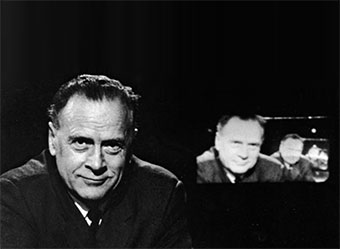
To get a taste of the world in which McLuhan was coming up with his theories, you might get a kick out of this this clip from the "Teenager" episode of the tv series CBC Explorations, originally aired May 18, 1960. The clothes, the haircuts, the pace are from 65 years ago, but many of McLuhan's observations ring prophetically true today. McLuhan starts talking around two and half minutes in, but whole thing is retro fun.
Here's the part of the interview where McLuhan talks about the distinction he sees between the "book man" of the past and "mass media man" of 1960:
I think the best distinction, Alan, might be found in the phrase “with it.” You know how we speak of being “with it”? Meaning we've understood completely. We've got the message, as it were, in every way possible. But in the older book or print culture people were not with it; they were away from it, by themselves, with their own private point of view. Now, you have no point of view when you're “with it” because you accept things totally. And we're “with it” because these new media of ours […] have made our world into a single unit. The world is now like a continually sounding tribal drum, where everybody gets the message all the time. A princess gets married in England. And boom boom boom go the drums. We all hear about it. An earthquake in North Africa. A Hollywood star gets drunk. Away go the drums again. I use the word tribal. It is probably the key word of this whole half hour. [ … ] I think you'll find everything we observe tonight about the media points in the direction of tribal man. And away from individual man. [ ... ] We're re-tribalising. Involuntarily we're getting rid of individualism. We're in the process of making a tribe.
The "individual" of the past, and the "tribal" participant of today; does this distinction make sense and stand up to careful scrutiny? Is "book man" entirely dead? And was the child of the tv age really "with it" as McLuhan suggests? "With it" seems to be the thing people who suffer from FOMO are trying to achieve.
Everyone on Earth can be "with it" now; but what exactly is it that we are with? Is it really important or that meaningful to know right away that a distant princess has gotten married, or that Zendaya has just had a wardrobe malfunction, or whatever? Why is that even a part of your reality? What impact can it have on you and your immediate world? Isn't it usually just more vicarious "entertainment," ultimately nothing to do with you - and nothing you can do anything with?
Reading or listening to him today, McLuhan seems mostly excited or neutral about the loss of individualism and "re-tribalisation" that the Global Village seemed to be bringing about. He seems to qualify as a techno-utopian, someone who believes technology will liberate humans, make them happier, solve our problems.
More dystopian views
Social critics have been concerned from the start about the rise in the consumption of "media" by their fellow citizens during the last hundred years (a tiny fragment of human history as a whole). It has often been argued that electronic media consumption has a tendency to dumb people down, compared - for example - to reading books, magazines and newspapers. Reading, it is assumed, encourages critical thinking, reflection, and the cultivation of one's imagination in ways that watching television may not.
Anti-capitalist critics meanwhile have argued that our entertainment media tend to be an extention of the consumerist demands for production of commodities that can be bought and sold for profit and that in turn reinforce the status quo of our capitalist worldview. Think of the multi-million dollar Hollywood movies, for instance, or the ads one had to watch on tv, or the subscription fees for streaming services. While a Netflix series may seem like an escape from the work one has to do all day, in many ways it is often no escape at all from the worldview that makes our work lives seem inevitable.
Isolation is another strange bi-product of our "communications" technologies. I often find it ironic that it is now our phones that make it easy for us to live in individualized isolated bubbles of unreality. The original phone, after all, was intended as a tool to communicate one human being with another in real time. It was two-way, and a form of virtual connection. But the "smartphone" is ironically an excellent means of disconnection (from real other people and lived experience). A medium is something between you and someone else. Originally, communications media were meant to make communication better between people. If I call my friend on the phone then ideally our communication will be as free of noise and manipulation as possible. But maybe the media we have created are actually something between us and reality (a buffer, a block) - even between us and each other. A screen.
Is it a good thing that many of us spend so much time viewing images and video in our lives these days? Is it a bad thing? Could it even be a dangerous thing for the future of humanity and democracy? These are some of the questions the writers we'll be looking at in the rest of this lesson are asking themselves - and us.
At the same time Marshall McLuhan was telling us we were now "with it," a group of politicized artists and activists in France were suggesting that we were getting further and further away from it, meaning from real human life and reality, all the time.
The Society of the Spectacle
I'm now going to tell you about a loose collective of artists and activists in the 1950s, 60s, and 70s who called themselves The Situationists. These people thought that the world in which everyone was working all day and then going home and watching tv on the couch all evening was a gross mistake. They were inspired by Marxist and post-Marxist critiques of Western culture in general, and argued that industrialization, consumerism, and the new broadcast media of the 20th century had perverted human relationships in an unhealthy and unnatural way.
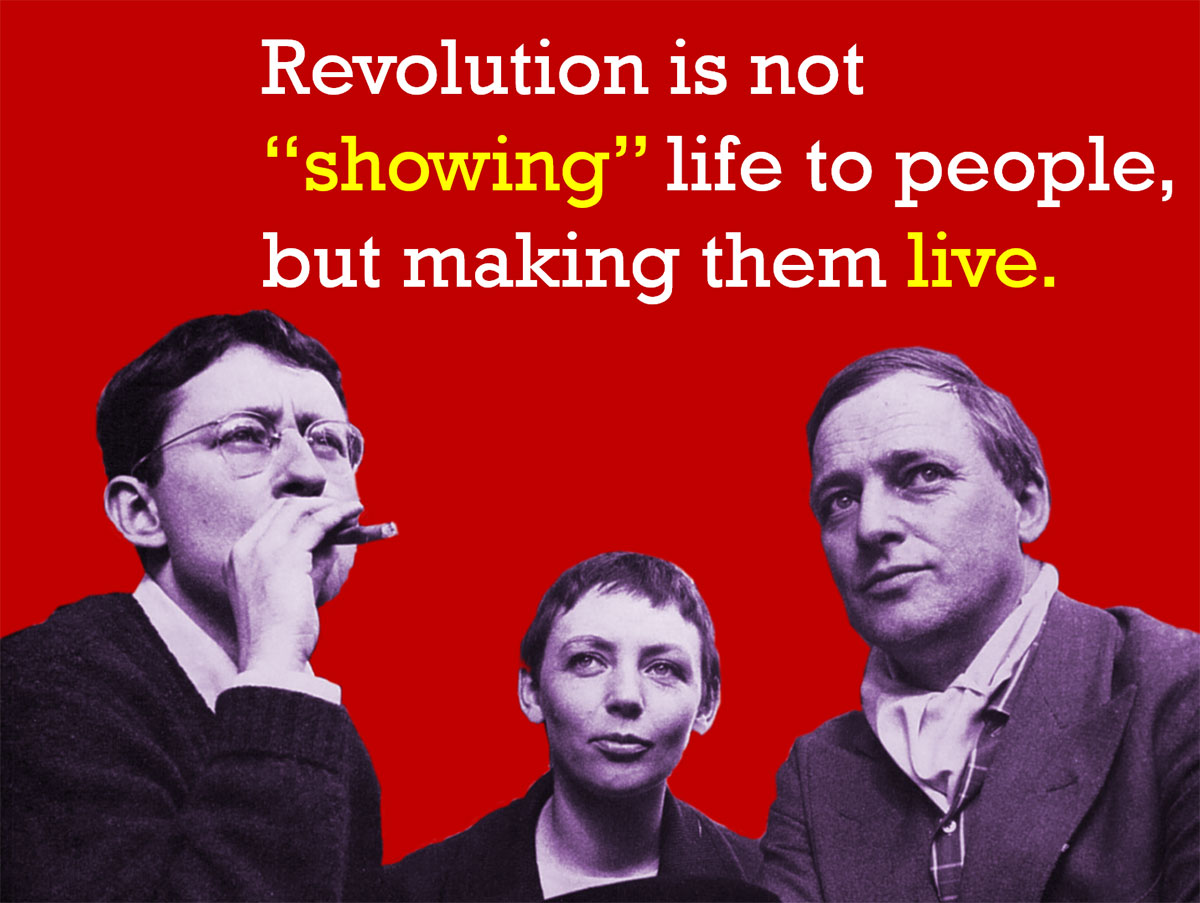
Guy Debord with two of his fellow artistic revolutionaries, Michèle Bernstein and Asger Jorn.
Previously our human relations had been directly with each other and with nature, but we now we increasingly related through manufactured objects and images. For these critics, "All that once was directly lived has become mere representation" (Guy Debord, The Society of the Spectacle, 1967). In other words, all human life is now mediated by products and unreal fictional or fictionalized images. Products, consumer goods, brands, corporate and government propaganda, escapist fantasies, unrealistic materialistic ideals, partial images of reality created for the sake of entertainment or sensationalism - all of them manufactured for the rest of us by professionals working for companies who want to exploit us - had come to replace authentic social interaction, meaningful work, and creative leisure.
Guy Debord was the central Situationist. He and his fellow activists believed that "everyday life"- life lived with other people doing meaningful practical tasks like making meals or working together - doing labour that was meaningful in itself, producing something of material worth had been taken away from us. (Work that created something really material, like a loaf of bread, not "materialistic" like a designer garment or handbag). These ways of being they saw as the natural and healthiest state for the human animal. They argued that with the industrialization and compartmentalization of work and the invention of manufactured commodities, human life had changed - and not all for the better, as is commonly supposed.
The Situationists believed that the proliferation of endless images in mass media, clogging any clear view of non-mediated reality, had changed our human "reality." The emerging culture of television - which encouraged people to forgo social relationships in order to sit at home on their couches and watch packaged human interaction as a "show" - had brought about a "Society of the Spectacle." Most of us no longer engaged in life directly and participated in society out in the world very much: instead, we sat back as spectators in our living rooms and consumed the false "life" that was projected on our screens for us by the "culture industry" that creates the manufactured media of Hollywood, television, and so on.
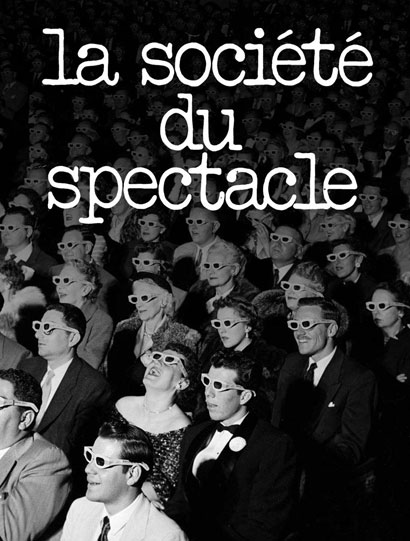
Before the triumph of the Industrial Revolution, most human beings had experienced life directly and participated in it. We laboured to grow the food that we would later eat. When we were done working for the day, we ate dinner together, talked, played games together, made music for ourselves, went to church, worked in the garden, went for a walk, and so forth. We participated in culture and nature.
In the 20th century, however, people living in the developed and wealthy parts of the world were able (and encouraged) to experience life in a passive and non-participatory way, through consuming film and broadcast media, television, advertising, brands, images. Instead of playing sports, we sat and watched spectator sports on television. Instead of making music ourselves, we listened to music made by professionals on records or on the radio. Instead of doing a lot of things we would have done ourselves in the past, we sat back and watched a manufactured spectacle of "people" doing those things (or simulating doing things) on screens for our passive entertainment. We could feel that "life" was not something we were subject to ourselves, but something we were disconnected from, in control of (as long as we had the remote in our hands). The mass media was a crucial part of the consumer society. We were not just consuming products; we were consuming images of life, rather than fully living life ourselves.
The Situationists felt that the wealth of developed nations had led to a meaningless work life and alienated leisure time for the average human, filled with vicarious dreams of the "life" they saw on television and in ads. The Society of the Spectacle contributed to the emptiness of modern existence, because it made us passive, isolated and detached, empowered in our viewing but inadequate-feeling in real life, and driven to ever greater consumption and escapism, in hopes of somehow being "like the people on TV" rather than living our own lives realistically.
A more recent leftist critic of consumer culture, Noam Chomsky, has talked eloquently of how he personally believes humans actually want to do things, not just be spectators, and how he believes an incredible amount of energy has to be expended by Hollywood, advertisers, and other manufacturers of mass culture to convince us that the world represented in the media is fascinating and important and that we will find happiness and success in consuming commodities and mainstream entertainment products, living vicariously through consuming media.
I don't know whether I really believe that the working class people of Chomsky's youth read books and went to see Shakespeare plays, but I don't think he's just a nostalgic fool either. I do believe that most people are happier and feel more alive when they are doing something, creating something, accomplishing something (tinkering with an auto engine, say) than when they are watching other people do things as passive spectators.

Tomasz Fularksi, Pride 1
Of course now we have the vicarious spectacle of watching people do crafts on TikTok, rather than doing them ourselves. Instead of dancing, playing with a pet, having a live conversation with someone they know, many people prefer to connect with the semi-real "people" in their socials, who expect nothing immediately back from them. It is easy and often one-way, just like tv was.
In a sense, with the Internet we do have a much richer and more "real" vicarious spectacle to enjoy, from the comfort of our disengaged couchdoms. Does watching people make a meal or carve wood inspire us to do those things ourselves, or are we happy just to stand by and watch, consume without producing? Enjoy without participating. Partake, but only through voyeurism?
Vicarious enjoyment means watching or hearing about someone else doing something and somehow imaginatively identifying with them and getting some of the effects of doing it oneself, even though one isn't really doing anything (except sitting in a movie theatre, lying on a couch, or staring into a phone on a bus). It's strange, if you think about it, that people can lie on the couch watching a crime drama and get stimulated through some kind of vicarious identification with onscreen lovers, adventurers, action figures.
This vicarious identification is superbly satirized in the Simpsons "couch gag" sequence "LA-Z Rider" (a take off on the old tv series where a computerized car helped David Hasselhoff solve crimes (Knight Rider, 1982-1986)). Here, a motorized couch assists a fantasized version of Homer in experiencing a Miami Vice kind of exciting, sexy, fast-paced "life."
One of the reasons you may never have heard of the Situationists before is because unlike the artists you've heard of they didn't make a lot of art, and they weren't all that interested in "getting picked up by the media" and turned into a media phenomenon. They thought the media were evil. Because the media kept us from living our best lives in reality. Some people still study and use ideas from the Situationists (like me). One such "neo-Situationist" is Mackenzie Wark, who worries about how our media consumption is not just putting individuals at risk of wasting their lives, but is putting the planet at risk, because we are disconnected from the realities of nature by our consumerist and escapist media-dominted culture. So much of our sense of "reality" is actually media, and so little of our media tries to convey the actual reality of our existence as animals in a biological world. As Wark once put it, this “tool” of (post)capitalist media systems (streaming, social media, images and videos) may mean suicide for humanity, because the media cannot really deal with “the earth as the home from which it has expelled us.” I'll be coming back to this idea later in the term, when I talk about Climate Change.
Amusing Ourselves to Death
You may say that it's nobody's business but your own if you want to kill time your whole life watching other people live, or simulate living, instead of living more yourself. But many critics have argued that our addiction to the Spectacle can affect our behaviour as members of society in a negative way - that it's not just bad for individuals, but that it's dangerous for society and the future of humanity. Our private consumption of escapist media can have a negative impact on the lives of other people, not just our own.
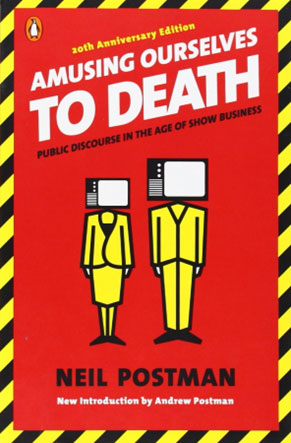
Many critics apart from Noam Chomsky have worried about the influence the mainstream media have on supposedly democratic citizens. They fear that overconsumption of these mostly showbiz "products" encourages people to become passive, dumber, less interested in social change (the tv shows mostly reinforce the existing "shadows on the wall"). The manufactured media of North America make people more "materialistic" (consumerist), and more escapist, and that these are bad things in a democratic society. In his groundbreaking book from the 1980s, Amusing Ourselves to Death (1985, but still a relevant read today), Neil Postman argued persuasively for the negative effects the broadcast media have on the depth of knowledge and understanding citizens have of their country, their world, and their government, and perhaps more importantly on their ability to tell (mediated) reality from (mediated) entertainment.
Looking at the state of American television and the consumerist Society of the Spectacle as an "outside insider," the great African American writer James Baldwin suggested that America's addiction to escapist media actually stands in the way of making America what it wants to be. The media are an unreal narcotic distraction from political and immoral realities that America needs to change rather than distract itself from (or actually reinforce):
Neil Postman published Amusing Ourselves to Death in the 1980s, before the Internet. The most common and popular way for people to learn about the world at that time was through television, the manufactured medium of which James Baldwin was so critical. Postman thought that the focus on entertainment was a dangerous political change from the world before television, when most people spent much less time consuming electronic media and had to read to find out about the world – books, magazines, newspapers - or perhaps discuss it live with real other people.
The medium of print, as Postman saw it, conveyed the complexity of reality better than television. Reading forced a person to participate actively in making sense; it forced them to use their imagination and to think and spend time understanding. It forced them to pay attention and presumably take what they were reading more seriously.
Television, on the other hand, shows you "reality" in a way that books and newspapers can’t; but what it shows you is always a highly partial, edited, packaged quick slice of reality, if it is reality at all. The people who make television are largely focused on entertaining you, not informing you, not making you think, or giving you a full argument or multiple points of view. They are also, primarily, focused on making money. And to do that they know they have to keep you entertained. Since we receive the news of real things through the same medium and packaged in much the same way as we receive drama, comedy, far-fetched fiction and mindless entertainment in TV shows, television may encourage us to see the real things in the news as unreal and as further occasions for entertainment as well. Television makes unreal things look real and real things look unreal.
Many people followed Donald Trump's first election, for instance, as ironic postmodern spectacle. It is like an episode of The Simpsons (It was one!). Except that the Trump presidency was not an episode of The Simpsons: it was real. Some people don't see that, don't care, or would argue philosophically that it's not real. They've never met Trump, for instance. "Trump" is a mediated and packaged image or a semi-fictional personality, not a real person. There is a sense in which this is true; but unlike Darth Vader or the Wizard of Oz, Donald Trump is in a position to make real changes to real reality that can impact real people who are actually alive right now.

I remember when my grandmother told me she was going to vote for former movie actor Ronald Reagan for president and added "He's such a handsome man!" Reagan won the election.
Television is focused on slick images, a fast pace, sensationalism and entertainment. Neil Postman thought it often packaged even real and important things as entertainment, and this encouraged the audience to think of these real things as less real, more like the unreal things that made up most of what was on television - and to feel the same about them.
Television didn’t make complete and logical arguments; it made "shows" or "ads" out of its images of life, even when it wasn't literally trying to sell you something. The programming, whether a sitcom, a political debate, or a news broadcast, is to some extent seen as "filler" by American corporate broadcasters. What they are focused on broadcasting is actually the ads, and the product they sell is actually the eyes of us viewers, sold to advertisers. (This model is also the one commercial social media platforms have adopted.)
Television as a medium encouraged passive consumption of its media as entertainment, and any real and serious things it tried to tell people started to be experienced as just more slickly presented images, just more entertainment.
Reading about stuff back in the day, paradoxically, had conveyed reality more fully than seeing images of that reality portrayed on television does. When reading a book, you had to think, analyse, understand, and see the complexity of reality more fully. You had to participate (through reading) and make meaning. What's more, it was harder to confuse the representation of reality in the book with reality itself. Video looks like a window on reality; a page of a book doesn't - or at least not in the same way.
Marshall McLuhan famously said "The medium is the message." What he meant in part was that we get a different communication depending on the medium we receive it through. "The same message" is experienced and understood differently depending on how we receive it (reading, listening, watching video, etc). Adam Holzapfel, a student in my Technology and Social Change course, drew attention to a classic example of this in one of his discussion posts for my class:
In the 1960’s political race between JFK and Nixon there was a televised debate and people who watched it on television believed JFK to have won the debate because he used makeup to prevent sweating, was more attractive than Nixon and overall, better composed when speaking. However people who listened to this debate on the radio believed that Nixon spoke and sounded better and therefore won the debate. This goes to show how much technology had an impact on the election because if these candidates were only presented through radio Nixon would have won. (emphasis added; Kennedy won that election, but was then assassinated; Nixon eventually was elected president later on, and had to resign because of the Watergate scandal)*
Reading a book, one perceives things differently than listening to it being read to you, or the same material in a podcast, or a YouTube video, or on tv, or in a meme. Each medium alters the message and how it will be received/perceived through the nature of how it communicates "the same" information.
The politics of media consumption
Worrying about the medium of television, Neil Postman made several hypotheses about the political effect of that medium on its audience; I have summarized some of the more important points below.
It’s true that we now have the Internet, a more interactive and potentially more realistic and creative way of getting at reality through electronic media. But the people of today here in Canada have had their expectations of the media shaped by the model of escapist consumerist entertainment that television made normal; hence our "selfie" culture in which everyone wants to present themselves as a packaged media celebrity, and now real people's lives are treated as escapist entertainment as well.
Please consider carefully some of Postman's concerns from the 1980s about our entertainment-focused media:
1. Mass media replaces complex ideas with simplified images. "A picture is worth a thousand words!" But is that really true? An image gives a powerful, but incredibly partial and emotional, glimpse of what is always a more complex situation. It’s fast and easy to see an image and get a message, but it requires no thought or consideration and focuses on a single emotional or aesthetic aspect of what it represents.
2. Mass media replaces positions with personalities. Positions (points of view and policies that are open to argument, revision, and critique) require people to understand and think about them. It is easier to respond quickly and instinctually to a personality than to understand and reflect on a set of ideas. The mass media cater to this with the focus on celebrities and personalities (who are "relatable" and fun, or seem sexy or handsome or powerful or classy, etc), rather than ideas or policies (which are complicated and difficult and require thought).

Postman argues that most voters will not take the time to study and fully understand the parties and the positions that the leaders represent. Instead, they often vote for (or against) the person (meaning their media image), based on whether that figure has a "look" or personality that they like, or find impressive, feel they can trust, or seems like them. Appearance can matter a lot in our media marketing reality. But behind this image are important policies, platforms, programs for change, or against it.
Perhaps almost all politicians have become dishonest showbiz personalities, but I like to remind people that these "performers" usually do still stand for different values. It is dangerous to vote for personalities. A national election isn't Canada's Got Talent or a high school popularity contest. Rather than thinking about how Justin Trudeau or Pierre Pollievre "strikes" you as a personality, or which one you are sick of looking at, you should have a clear understanding of the policies their parties stand for.
3. Mass media replaces arguments with ads. A slogan like "Make America Great Again!" is an emotional rallying cry, rather than a plan of how the world will be affected. People are often happy to have their messages quick and easy, and this leads to the tendency of the media to try to "sell" them things in the simplest and most one-sided way. Instead of a public discussion of goals and a realistic analysis of who will benefit and suffer, appeals are made at the most basic and unthinking level. Most of the public is happy to have this quick way of deciding about a difficult and complex decision: loved their ad!
4. Mass media replaces active understanding with passive entertainment. Unlike reading a book – even an escapist fantasy novel – movies, ads, and television don’t demand anything from you in consuming them. You don’t have to use your imagination or try to understand what the author is telling you; you can just sit back and take it all in, uncritically and uncreatively. Or ignore it. Some people, like Guy Debord, argue that this leads to a view of oneself as a consumer and a mere watcher of culture. It discourages attention or involvement in political matters and, again, discourages thinking.
5. Mass media is too often escapist, distracting, fake, unrealistic, and exploitative.
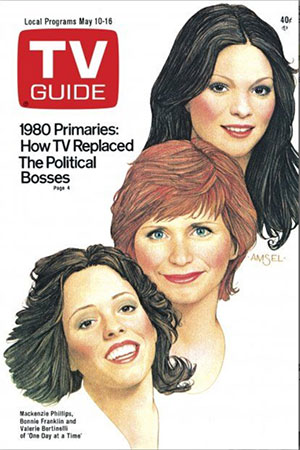
So much video content is packaged escapism that Postman thought we had started to treat our news and serious political content that way as well. Like fiction, it is generally about people we don't know and will never meet. In a certain sense, none of it is real in our own lived experience. All of it is packaged and mediated through a screen. If we do not feel we run any political risk ourselves, it is easy for us to ignore the seriousness of politics and to consider it as irrelevant to our own lives when we experience it mainly through a screen.
Postman was most worried about the political ramifications of treating everything as quick and uncomplicated entertainment. He thought the system of liberal democracy required citizens who were engaged and thoughtful, not citizens who turned everything into meaningless escapist entertainment. Many educated people around the world today are afraid that democracy is doomed - partly because of the power and pervasiveness of citizens' engulfment in media.
Do we in Canada still want to be able to influence our government's policies, do we think we still can, or have we decided it is hopeless and we just want to wallow in the entertainment possibilities of politics as delivered to us through the media? Certainly, the United States has increasingly seemed to find it difficult to make the distinction between the realities of life and the "shadows" of life it sees on tv. Our most recent televised debates here is Canada haven't been any better than the asolecent game show diss battles and posturing of the U.S. debates at their worst, just less captivating as entertainment.
The lesson on Plato's Allegory of the Cave hinted at how hard it is to know if something is real, and also opened the question of whether we actually want more reality in our lives, or whether we even can get it if we do want it. Few people at this point in history are seriously interested in giving up on the consumption of media entirely, and yet media is all - in some sense - shadows on the cave wall. Is it not dangerous for us to continue treating politics as an unreal shadowplay and ourselves as passive consumers of this unreal spectacle - when politics ultimately shapes much of our reality for better or worse?
"Television makes real things seem unreal and unreal things seem real." Is that even truer of your phone? This is why the media is a problem for those of us who are troubled by it. We want reality, but we can only get it through shadows. Are some shadows better representations of reality than others, even though they are still only representations of course, or can we never get to anything but false shadows? That is the question.
* Apparently, this well-known example is actually a bit of a myth, as it was based on somewhat flimsy data from one survey. In recommending caution, Marie Morelli added, however, that "The myth may have gained some currency from the reported reactions of the running mates. Both vice presidential candidates -- Henry Cabot Lodge for Nixon and Lyndon Baines Johnson for JFK -- thought their man had lost. Lodge watched on TV; Johnson listened on the radio." (Morelli 2016). Poorly substantiated or not, I think we can all easily see how it could have been true.